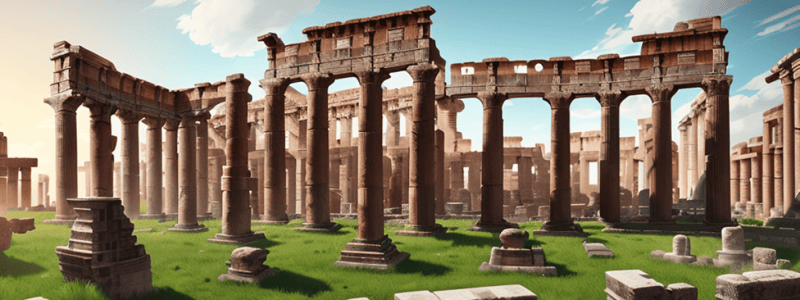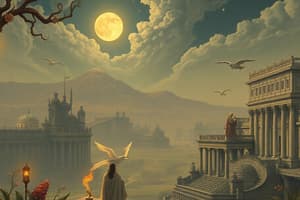Podcast
Questions and Answers
What does the word 'aeternum' mean in the context of the text?
What does the word 'aeternum' mean in the context of the text?
- Madness
- Bronze
- Swift
- Eternal (correct)
Which goddess is mentioned in the text as the one who scattered and threw apart the Greek fleet?
Which goddess is mentioned in the text as the one who scattered and threw apart the Greek fleet?
- Juno
- Minerva
- Athena (correct)
- Pallas
What did Juno do to the ships and the sea, according to the text?
What did Juno do to the ships and the sea, according to the text?
- Set them ablaze
- Enveloped them in darkness
- Scattered and overturned them
- Summoned a storm (correct)
What is the meaning of the word 'furias' in the context of the text?
What is the meaning of the word 'furias' in the context of the text?
Who is mentioned as the one who could burn the Greek fleet and drown the Greeks themselves in the text?
Who is mentioned as the one who could burn the Greek fleet and drown the Greeks themselves in the text?
What did Juno do to the ships and the sea, according to the text?
What did Juno do to the ships and the sea, according to the text?
Which term refers to Vergil's beginning of the Trojan narrative at a pivotal point?
Which term refers to Vergil's beginning of the Trojan narrative at a pivotal point?
Who plays a significant role in the narrative in relation to the Greek Ajax and the Trojan princess Cassandra seeking sanctuary in her temple?
Who plays a significant role in the narrative in relation to the Greek Ajax and the Trojan princess Cassandra seeking sanctuary in her temple?
Which character is introduced as the ruler of the winds and storms?
Which character is introduced as the ruler of the winds and storms?
Which stylistic device does Juno use in her speech to reveal her bewilderment and anger?
Which stylistic device does Juno use in her speech to reveal her bewilderment and anger?
What does Juno express in her soliloquy, suggesting Minerva's ability to destroy Ajax's entire Greek fleet?
What does Juno express in her soliloquy, suggesting Minerva's ability to destroy Ajax's entire Greek fleet?
What is the significance of the various forms of the word 'sea' used by Vergil in the Aeneid?
What is the significance of the various forms of the word 'sea' used by Vergil in the Aeneid?
What does the ancient world believe about the movement of the four primary elements?
What does the ancient world believe about the movement of the four primary elements?
In Vergil's storm episode, how is disorder caused by winds depicted?
In Vergil's storm episode, how is disorder caused by winds depicted?
What are the winds identified as in lines 51 to 59 of Vergil's work?
What are the winds identified as in lines 51 to 59 of Vergil's work?
What is associated with disorder in Vergil's work?
What is associated with disorder in Vergil's work?
Who imposes order on nature as a whole by restraining the winds in these lines?
Who imposes order on nature as a whole by restraining the winds in these lines?
What is the role of emotional restraint in nature and individuals according to the text?
What is the role of emotional restraint in nature and individuals according to the text?
In Roman religion, what is the nature of prayer and sacrifice?
In Roman religion, what is the nature of prayer and sacrifice?
What does Juno express concern about regarding the Trojans' worship of the gods?
What does Juno express concern about regarding the Trojans' worship of the gods?
Flashcards are hidden until you start studying
Study Notes
Ancient Science and Emotional Disorder in Vergil's Storm Episode
- The ancient world believed in four primary elements with their own natural place: earth and water move downward, while air and fire move upward.
- In Vergil's storm episode, disorder caused by winds is depicted as the unnatural mixing of elements, while order is the separation of these elements into their natural places.
- Emotional winds create disorder in nature, paralleling the way emotions create disorder in individuals.
- Violent emotions are associated with disorder, while emotional restraint is associated with order in Vergil's work.
- Lines 51 to 59 identify the winds as violent emotions or unrestrained beasts, with the gods restraining them to impose order on nature.
- The winds, unrestrained, create chaos by moving the four elements from their natural place.
- Jupiter, Aeolus, and Neptune impose order on nature by restraining the winds and allowing the elements to take their natural place.
- Emotional restraint that works in an individual also works in nature.
- In Roman religion, prayer and sacrifice are transactional; Romans honor a god to gain a reward or avoid suffering.
- Juno says that if she cannot punish the Trojans, they will be able to worship and adore the gods without consequence, leading to a lack of honor and offerings.
- The text mentions Latin words and their meanings, such as "Aeolia Auster" referring to the south wind, and "vinculum" meaning chain.
- The text also highlights the role of gods like Jupiter and Juno, as well as the emotional and natural elements depicted in Vergil's work.
Studying That Suits You
Use AI to generate personalized quizzes and flashcards to suit your learning preferences.




